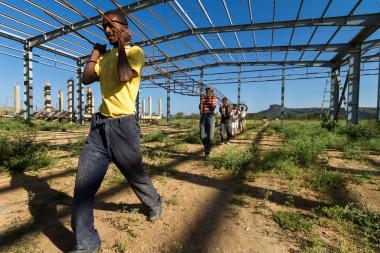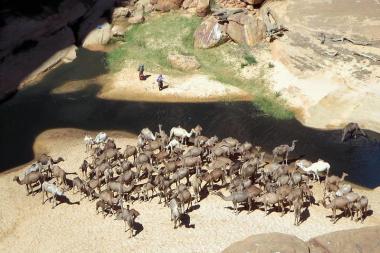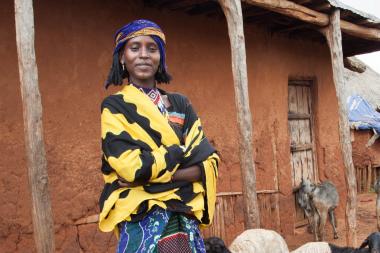Side event
SPARC at COP26
Discover how some of the key lessons that emerged from COP26 will inform the future direction of SPARC research and engagement.
Event date and time 10:00am GMT
The United Nations Climate Change Conference of the Parties – COP26 – was a key opportunity for governments, donors, practitioners and knowledge brokers to stimulate action to achieve the ambitions of the Paris Agreement and the UN Framework Convention on Climate Change.
Here you can learn how SPARC led the debate during a host of events, engaged in key policy discussions, and shared the research and knowledge it has generated.
Read below to find out how some of the key lessons that emerged from COP26 will inform the future direction of SPARC's research and engagement.
Collaboration between humanitarian and climate adaptation actors is key to supporting fragile states
Humanitarian and climate adaptation communities must come together to help build resilience in conflict-affected and fragile states
Farmers and pastoralists in the Sahel and the Horn of Africa are highly vulnerable to the compounding risks of climate change and conflict. Climate change exacerbates the drivers of conflict, including resource scarcity, and conflict reduces people’s and institutions’ ability to adapt to climate change.
However, as SPARC research has shown, despite this vulnerability, most fragile and conflict-affected countries in the Sahel and Horn of Africa region receive less climate change adaptation funding than other least developed countries (LDCs).
During a high-level event on November 1, organised by SPARC as part of the World Leaders’ Summit at COP26, international leaders and experts discussed the need for more coordination between the humanitarian actors most active in fragile countries and the climate adaptation community. This partnership will depend on a harmonisation of mandates, funding mechanisms and terminologies, and a new approach to how we see risk.
The current organisational divisions prevent much needed long-term investment in resilience and institution building in unstable settings. COP26 has shown us that humanitarian action requires close coordination and the need to embrace a common agenda.
SPARC will continue to work as a knowledge broker, sharing important insights – particularly of people living in dryland regions – to those who are taking key decisions to help humanitarian responses.
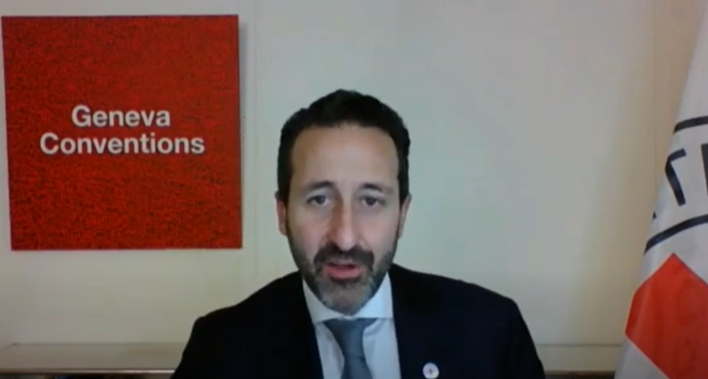
Robert Mardini, Director-General, International Committee of the Red Cross and event panellist
“We really need to come together and make this work. The international community has committed to leaving no one behind. Well, this includes people affected by conflict and violence.” – Robert Mardini, Director-General, International Committee of the Red Cross (ICRC), event panellist.
Watch the event here.
Anticipatory action has the potential to be used for greater benefit
In the Greater Horn of Africa, one in five people have livestock, and pastoralism is vital to the economy. However, it is also a highly risky activity, with increasingly frequent droughts, which - in combination with other crises - cause severe problems for pastoralists and agro-pastoralists.
Traditionally, governments and humanitarian organisations have often stepped in to support pastoralists and farmers in the region in the wake of such crises. However, in recent years, these actors have begun exploring ways to provide support before crises occur, to mitigate their effects or prevent them altogether.
Early experiences show that such anticipatory action can provide communities with a buffer to prevent damage, enable people to protect their families and livelihood assets, and reduce disruption from climate extremes and other shocks. This new approach was discussed by an ODI-led panel at the COP26 Resilience Hub on November 3.
Panellists said that though promising, early action mechanisms still tend to be small-scale and fragmented. The added that to scale them, early warning systems must be strengthened, and more efforts made to understand what information users need, and when it is most useful to them. Effective early action responses also depend on a shift in the mindset of the humanitarian community, which too often still requires proof of damage done to release funding.
SPARC understands the importance and potential of anticipatory action. We will continue to invest in understanding how people in fragile contexts work to prevent the impacts of crises. Lessons that come directly from those living in the drylands are critical to improve the design, delivery and effectiveness of preventative aid measures.
“Data sharing is key for anticipatory action - you need more than just an early warning system, you also need information on the local population, migration and many other dynamics.” – Oscar Lino, Kenya Red Cross Society, event participant
“Communities affected by climate shocks have ideas that have never been explored. [They] should have a voice on when is the right time to act.”
– Dr. Ibrahim Dagane Ali, Hexagon Consulting Somalia and SPARC, event participant.
Watch the event here
Reshaping misinformed narratives around climate and migration
We need more nuanced narratives on migration and climate change
Migration has always played an important role in agropastoralist communities’ strategies to survive and make a living in the drylands of the Sudano-Sahel region. In recent decades, conflict, land degradation and climate change have increasingly changed mobility patterns in the region, either by displacing people or by disrupting their usual seasonal migrations.
Overall, climate change is expected to increase migration within and beyond the Sahel region, but the exact mechanisms through which it will do so are not well understood. At a virtual event organised by SPARC at the COP26 Resilience Hub on November 4, experts dispelled much-repeated myths about climate change-induced migration and examined opportunities to harness mobility for conflict-sensitive climate adaptation across the Sahel.
Panellists said that rather than being primarily international and permanent, human mobility in the Sahel is characterised by cyclical movements that are primarily intranational and intraregional, and seasonal rather than permanent.
The event also highlighted that women, as well as men, are increasingly on the move, but the needs of women remain poorly understood and therefore unaddressed. The panel discussed how migrating agropastoralists throughout the region are facing increasing barriers, including difficulties gaining access to land and water. They added that eliminating those barriers can significantly enhance the resilience of these communities.
Looking ahead, SPARC will take its cue from COP26 in the design and dissemination of its research on migration in fragile and conflict settings to better understand why people migrate, how they do it, and to understand both the costs of migration as well as the benefits.
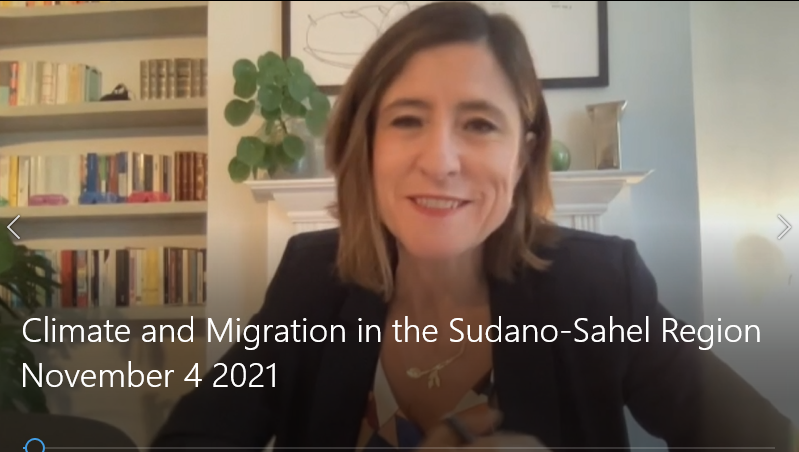
Marta Foresti, Director, ODI Europe, and event chair
“We really need to move away from what are often oversimplifications, the dichotomy about migration either being very negative and bad, something to be stopped and avoided, or the ultimate panacea that will make all sorts of development outcomes possible.” – Marta Foresti, Director, ODI Europe, and event chair.
Watch the full event on the SPARC YouTube Channel.
Transboundary climate and adaptation risks matter
Climate change knows no borders, and neither should climate adaptation: transboundary climate and adaptation risks matter
There has been awareness that the impacts of climate change and climate mitigation can cross national borders. But until recently, there has been scant recognition that climate adaptation and the potential impacts of climate adaptation measures transcend local and national borders. Little attention has been paid to the need for transboundary climate adaptation action, or conversely, potential transboundary effects of national adaptation actions.
To help to address this, SPARC recently published a report - in English and French - investigating a range of transboundary climate and adaptation risks (TCARs), such as negative impacts of failed anti-desertification efforts or green economy mining. The report, accompanied by a series of infographics, investigates African policymakers’ and experts’ perceptions of these risks, examines what triggers the risks and how they spread, and explores regional cooperation strategies to address them. SPARC researchers discussed their findings at a COP26 event on November 5.
The panellists highlighted that more research and capacity building are key to help countries recognise and address transboundary climate and adaptation risks. They added that more research is needed to identify TCARs relevant to different countries, to assess their severity and to assess good practices for addressing TCARs and their potential for scale.
The attendees also discussed how countries will need to be supported with tools, guidelines, and capacity building to allow them to identify TCARs resulting from their current plans, harmonise risk assessments across borders, and undertake TCAR-sensitive planning and budgeting.
As our work on TCARs matures, SPARC will focus on the practical political and administrative impact of this research, particularly its role in offering insight on how policy- and decision-makers can incorporate TCARs into their National Adaptation Plans.

George Wamukoya, Team Leader and Leadership Programme Director, African Group of Negotiators Expert Support (AGNES), and panellist
“When countries do their planning for the Nationally Determined Contributions or National Adaptation Plans, they do not look beyond their borders, and yet, what they do as adaptation within their borders may have a major impact across their borders.” – George Wamukoya, Team Leader and Leadership Programme Director, African Group of Negotiators Expert Support (AGNES), and panellist.
Watch the full event on the SPARC YouTube channel.
We need to listen to youth voices
Youth voices were louder than ever – it is time to listen
Youth voices took centre stage inside COP26, on the streets outside in Glasgow and in cities all over the world. Their demands for ‘less blah blah blah’ and more action resonated throughout the conference and were echoed at SPARC events. Across the countries where SPARC works, the ’Resilient Generation’ is a massive demographic force. On one hand, many youth continue to face major challenges including limited opportunity and employment, and poverty. On the other hand, youth dynamism and entrepreneurial energy is everywhere.
On youth day on November 5, SPARC highlighted the need to support young people’s prospects for decent work in the drylands of east and West Africa, and showcased a report on the ‘Resilient Generation’, which proposes ways this could be achieved.
Engaging youth, supporting their aspirations, and promoting economic opportunities and jobs are key elements of security in fragile countries. SPARC recognises this, and continues to support research into not only how youth can meaningfully engage in pastoralism, agriculture and related activities, but also in understanding what happens when young people leave rural livelihoods for other opportunities.
Find out more about SPARC engagement at COP26 here.
